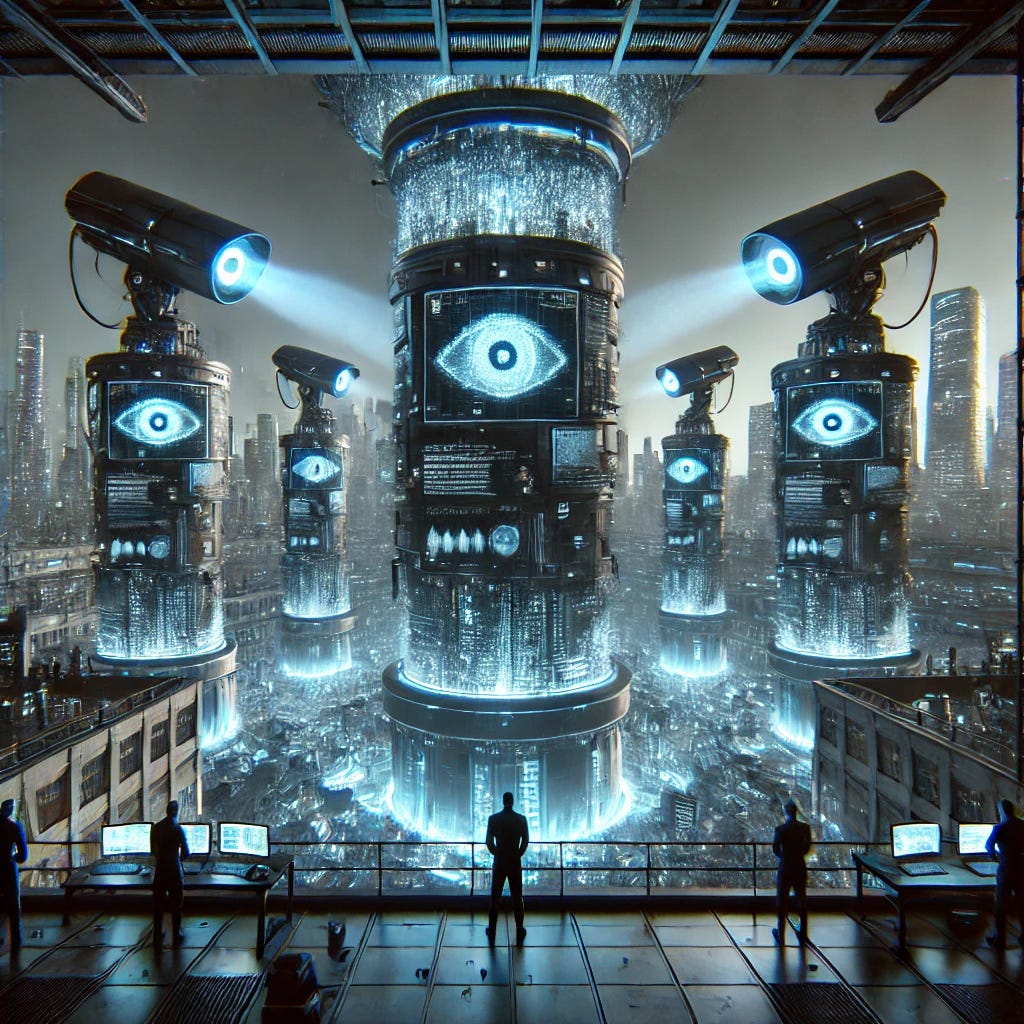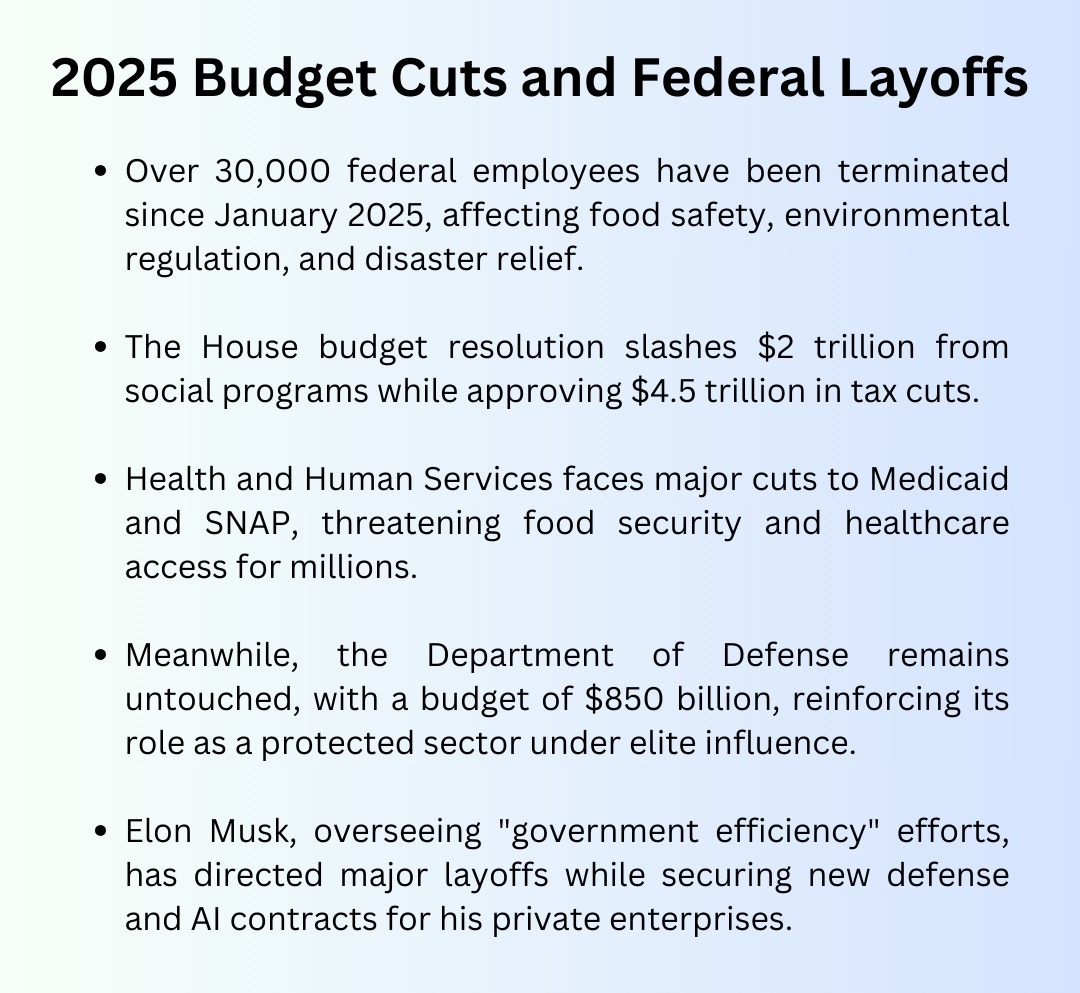The Illusion of a Shrinking Government
How Autocrats Consolidate Power Through Technology
If we’ve learned anything from Joe Biden’s presidency, it’s this: the machinery of government can run on autopilot. By the end of his term, it was clear to anyone paying attention that Biden was no longer functioning as the executive leader in any meaningful capacity. The signs of cognitive decline weren’t just speculation—they were undeniable. And yet, the government didn’t grind to a halt. It kept moving. The bureaucracy took over, operating independently, wielding a form of unelected power that many have suspected for years.
And here’s the uncomfortable truth: that suspicion isn’t wrong. People are right to question whether the bureaucracy has its own momentum, whether it can function without direct leadership. It can—and it does.
This isn’t an argument against limited government or personal freedom—far from it. These values have deep roots in American political thought and are held by many out of genuine conviction. There are millions of people—hardworking, thoughtful citizens—who believe in these ideals because they want a government that respects their freedoms and stays out of their lives. That belief isn’t wrong. In fact, it’s rooted in a legitimate fear of government overreach.
But here’s where things become dangerous: those sincere concerns are being manipulated by forces that don’t actually serve those values. The rhetoric of “shrinking government” can become a mask for something far more insidious—an effort to consolidate power, not dismantle it. The language of freedom can be twisted into a tool for building a system that serves executive authority, not the people.
We’ve been sold a lie: that authoritarian leaders want to shrink government. They don’t. They want to redesign it—reshape it into a streamlined, efficient machine of control, built not to serve the people but to serve power itself. The illusion of a “smaller government” is just that—an illusion. Beneath the surface, it’s not shrinking; it’s consolidating, becoming more efficient, more invasive, and far more dangerous than most people realize.
The Myth of Shrinking Government
For decades, the idea of “small government” has been a rallying cry—particularly among conservatives and libertarians. The rhetoric is familiar: government is bloated, inefficient, and intrusive. The solution, they argue, is to strip it down, cut the red tape, and return power to the people. These arguments aren’t without merit. Efficiency in governance is not inherently dangerous—it can be necessary, even beneficial. No one wants a system weighed down by unnecessary bureaucracy that stifles progress and wastes resources.
But what we are witnessing right now should make it clear: the immediate actions of an administration cutting programs and firing public employees are not happening in good faith. The justification is "saving taxpayer money," but that’s a pretense. The reality is a calculated transfer of power and resources—one that comes at an extraordinary human cost.
Tens of thousands of federal workers are losing their jobs. These are not nameless, faceless bureaucrats. They are food safety inspectors, air traffic controllers, disaster relief coordinators, and researchers monitoring public health. They are the people ensuring that government services actually function—services that millions rely on, including those who voted for the very leaders implementing these cuts.
The far-right celebrates this as long-overdue "government downsizing," while others—including legal scholars—warn that these firings violate both civil service protections and constitutional norms. But no matter where one stands politically, the real question is this: What happens next?
Not all purges lead to decentralization. In fact, history tells us that when mass firings and agency overhauls take place, they are rarely about reducing government power—they are about redirecting it. This is not about removing waste. It is about eliminating obstacles to an increasingly centralized authority.
Who Benefits? Follow the Money and the Power
If sweeping job cuts and budget reductions were truly about fiscal responsibility, we would see a balanced approach—one that demanded sacrifices from all sectors of government. Instead, what we see, time and again, is a deliberate reallocation of power and resources, not an actual reduction in spending.
While essential government programs are slashed, one sector always remains untouched—or even strengthened: defense and surveillance. The same leaders who claim the federal government is “too big” somehow always find justification to maintain, if not expand, military budgets and corporate contracts.
Layoffs and funding cuts disproportionately affect public-sector workers and the services they provide—food safety, public health, education, environmental oversight—while at the same time, money continues flowing into defense technology and private-sector contractors stepping in to fill the gaps left by fired federal employees.
What gets labeled as “inefficiency” and “government bloat” is often just the parts of government that serve people rather than corporations and elite interests. What gets prioritized, in contrast, is the machinery of power—military expansion, surveillance technology, and executive control over national infrastructure.
This isn’t about reducing government. It’s about reshaping it. And the real winners are not the taxpayers, but the corporate interests aligned with those in power.
Remote Control Autocracy—Technology as a Tool of Power
In the modern era, authoritarianism doesn’t need boots on the ground to consolidate power—it just needs the right technology. The tools of control today aren’t brute force and visible oppression; they’re algorithms, data collection, and digital surveillance. The machinery of government is no longer confined to physical institutions—it extends into the digital world, where control can be exercised invisibly and, ironically, more "efficiently" than ever before.
This isn’t hypothetical—it’s already happening. Surveillance systems, predictive algorithms, AI-powered monitoring tools, and social media platforms have quietly redefined how power operates. What’s most concerning isn’t just the existence of these tools, but how they’re being shaped by those who have both wealth and influence—figures like Elon Musk, whose control over platforms like X (formerly Twitter) extends far beyond free speech debates.
The False Focus on Individuals: A Blindspot for Liberals
It’s easy—almost comforting—to focus on individuals when trying to understand the rise of authoritarianism. It’s tempting to believe that if we could just remove a few bad actors—an Elon Musk here, a Donald Trump there—the system would right itself. This way of thinking is seductive because it offers a clear target for blame and a simple solution: get rid of the villain, and the threat disappears.
But that’s not how power works—especially not now.
The real danger isn’t found in government overreach alone—it’s in how power is being consolidated and streamlined into the hands of a centralized executive authority, serviced by techno-autocrats. The mass firings and budget cuts happening right now are not the endgame—they are just a phase in a larger restructuring. This is how modern authoritarianism functions: not by simply destroying government, but by transforming it into a highly efficient, tightly controlled instrument of autocratic power (or, as Elon Musk likes to call it with characteristic smugness, “tech support”).
It’s easy to dismiss these shifts in power as something that only concerns political elites, technocrats, or those on the ideological fringes. But that would be a mistake—because this transformation is happening right in front of all of us, and it affects everyone, no matter where they stand politically.
This is the challenge of our time: recognizing that the real threat to freedom doesn’t always come draped in tyranny. It often comes wrapped in the language of efficiency, order, and even patriotism.
I am hope that you will join me in thinking through these issues together. Dare I say, stay tuned?
#GovernmentEfficiencyHoax #BigTechTyranny





"This transformation is happening right in front of all of us, and it affects everyone, no matter where they stand politically". The Proximity Portal
There is some real shrinkage going on. A good friend told me this morning that the question to ask is no longer, "how did we get here but how do we get far away from here?" I agree. I am a civil service brat. My mom, dad, aunts and uncles worked for an array of agencies. These jobs, at the time were seen as beneath the general public to do. My family worked hard and these low paying jobs were roads into the middle class. People.... if you are obsessing over wages paid to government workers you are overlooking the decline of the American wage. The goal today is to remove the middle class. The last several weeks, the bulldozer has effectively done this. I hear people say, "smaller government is a good thing." And I always ask, how do you know this? The answer always come to be less taxes. Taxes are like stamps; people pay for them, but they don't know how the price is determined. Middle class people pay taxes because upper class people and lower income people don't. This what a tax break is. People don't pay attention to how government is funded. It so frustrating. Get ready, Medicaid is about to be cut $800 billion dollars to fund the tax breaks for the wealthy. Everyone does not pay their fair share and the mantra, 'when I get to be rich, I don't want to pay taxes: is right next to, 'when I win the lottery' and 'When Santa comes and brings me my special gift." These childish beliefs.
Bureaucracies are not bad. They are beneficial "to the people" when the laws and policies are just and the funds are used for the purposes intended. We pay a little and get 'big dividends' from governmental institutions (federal, state, and local). But when the laws and/or policies are corrupt this does not happen. People pay and get nothing in return. Welcome to modern day taxation.
Education is a bureaucracy. The teacher should be the highest paid profession in this country, but they struggle because people don't understand what they are paying for. Soon the dissolving of the federal department of education, the cessation of federal funding, and the deportation of children, will cause hundreds of schools across this country to close, and teachers to be fired. The middle class will take another hit.